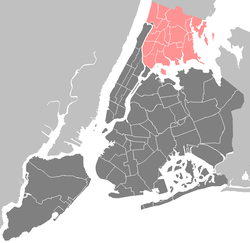RiverBay Corporation
| Co-op City | |
|---|---|
| Neighborhood of the Bronx | |

Co-op City, as seen from the east, sits along the Hutchinson River.
|
|
| Location of Co-op City in the Bronx | |
| Coordinates: 40°52′26″N 73°49′46″W / 40.8738889°N 73.8294444°WCoordinates: 40°52′26″N 73°49′46″W / 40.8738889°N 73.8294444°W | |
| Country |
|
| State |
|
| City | New York City |
| Borough | The Bronx |
| Constructed | 1973 |
| Named for | Short for Cooperative City |
| Area | |
| • Total | 2.42 km2 (0.936 sq mi) |
| Population (2010) | |
| • Total | 43,752 |
| • Density | 18,000/km2 (47,000/sq mi) |
| Ethnicity | |
| • White | 8.5% |
| • African-American | 60.5% |
| • Hispanic and Latino Americans | 27.7% |
| • Asian | 1.2% |
| • Other | 2.1% |
| Economics | |
| • Median income | $43,431 |
| ZIP code | 10475 |
| Area code(s) | 718, 347, 929, and 646 |
Co-op City (short for Cooperative City), located in the Baychester section of the borough of the Bronx in northeast New York City, is the largest cooperative housing development in the world. Situated at the intersection of Interstate 95 and the Hutchinson River Parkway, the community is part of Bronx Community Board 10. If it were a distinct municipality, it would be the 10th largest city in New York State. Nearby attractions include Pelham Bay Park, Orchard Beach and City Island. The community's Zip code is 10475.
Originally a swamp, the site was formerly the home of a 205-acre amusement park named Freedomland that operated from June 19, 1960 to September 1964. Construction on Co-op City began in May 1966. Residents began moving in during December 1968, and construction was completed in 1973. Its 15,372 residential units, in 35 high rise buildings and seven clusters of townhouses, make it the largest single residential development in the United States. It sits on 320 acres (1.3 km2) but only 20% of the land was developed, leaving many green spaces. The apartment buildings, referred to by number, range from 24 floors to as high as 33. There are four types of buildings; Triple Core, Chevron, Tower and Town House. The 236 townhouses, referred to by their street-name cluster, are three stories high and have a separate garden apartment and upper duplex three-bedroom apartment.
Co-op City is divided into five sections. Sections one to four are connected and section five is separated from the main area by the Hutchinson River Parkway. Each street in a section is denoted by a letter of the alphabet. All streets in section one begin with the letter "D", section two begins with the letter "C", section three with the letter "A", section four with the letter "B" and section five with the letter "E". Most streets in the community are named after notable historical personalities such as Earhart Lane for Amelia Earhart, Einstein Loop for Albert Einstein, Casals Place for Pablo Casals and Dreiser Loop for Theodore Dreiser.
...
Wikipedia

